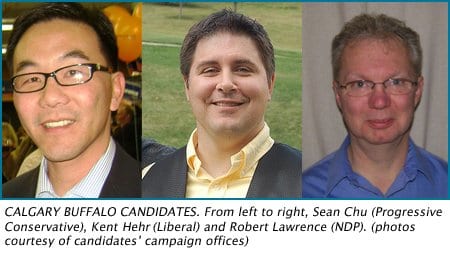***
In Calgary, the Beltline — just south of downtown — is the community with both the highest urban density and the largest queer population in Alberta. Although not as established as other Canadian gay villages, there is a critical mass of queers and queer-friendly businesses that gives Calgarians a haven for finding martinis, designer couture or a Priape store in easy walking distance.
Calgary Buffalo is the name of the provincial electoral riding housing the Beltline. From 1986 to 2001 the riding voted Liberal, bucking the trend in the rest of the city, which has been overwhelmingly Tory for the past 37 years. In 2001, Conservative Harvey Cenaiko, a popular Calgary Police Service inspector who had worked extensively with the queer community, was elected on a narrow margin and re-elected in 2004. He decided this year not to seek re-election.
Therefore the stakes are high in Calgary Buffalo in the upcoming Alberta election on Mar 3. There is no incumbent, and the riding has a history of narrow victories between the candidates. As might be expected, all of the Calgary Buffalo candidates are trying to curry the favour of queer voters.
The three main contenders are Progressive Conservative Sean Chu, Liberal Kent Hehr, and New Democrat Robert Lawrence. Interestingly, each candidate says their minority status represents the increasing diversity in the city as well as their sensitivity to issues of discrimination.
All three are in favour of amending Alberta’s human rights legislation to include sexual orientation as protected grounds for discrimination. While not stated explicitly, sexual orientation is protected in Alberta since 1998 and it is “read into” the Human Rights, Citizenship and Multiculturalism Act. The three candidates are also amenable to including gender identity, which currently has no status in the act.
All are in favour of including queer issues in the public school curriculum, as endorsed by the Alberta Teachers Association. All are supportive of queer families, same-sex marriage, and all are in favour of adoption and foster care placements to queer families.
Liberal candidate Kent Hehr is a well-known lawyer and quadriplegic. He was named one of the 20 most compelling Calgarians to watch in 2008 by the Calgary Herald. Some consider Hehr to be the front-runner due to both his own charms as well as the fact that 51 percent of Calgarians polled this month said they would prefer a change in government, compared to 28 percent who’d rather see the Tories re-elected.
Hehr claims he knows the community and believes he is attracting the queer vote.
“I think it is important for an MLA to be involved in all aspects of the community,” he says, listing his involvement with AIDS Calgary and participation in Pride and the OutRights conference (part of the OutGames sporting event). “I am receiving good support from the rank and file of the [queer] community, many who have been working hard on my campaign.”
New Democrat candidate Robert Lawrence, an out gay man, is an active member of the Alberta Union of Provincial Employees and has worked as an equality activist for years. Lawrence and his partner of 29 years sued the government of Alberta for same-sex pension rights.
“We [also] threatened to sue them about same-sex spousal benefits, and they just gave them to us because they did not want to be sued again,” he says.
They were also one of the first few couples to launch a human rights complaint for same-sex marriage in the province before it became legal nationwide.
Sean Chu, the Progressive Conservative candidate in Calgary Buffalo, has been given the blessing of the outgoing MLA Harvey Cenaiko. Not only are they of the same political stripe but both came to politics from the Calgary Police Services.
When asked about the Conservative Party’s historical stance on queer issues Chu says he represents a new forward-thinking wing of the party.
“As a visible minority I represent this change in the party and encourage everyone to come down to my office and meet me,” says Chu, a Chinese-Canadian. “Times change and we look back at history and see different groups of people without rights or being discriminated against and it looks ridiculous now.”
Community activist Grant Neufeld lives in Calgary Buffalo and coordinates the website CalgaryDemocracy.ca, which is an information clearinghouse for the Alberta election.
“I think the political party with the most clear policies supporting queer issues is the NDP,” he says. “We certainly cannot count on the Conservatives for supporting the interests of the queer community — I think we would be much better off with any of the alternatives.”
Neufeld ran as the Green Party candidate in Calgary Buffalo for the 2004 election and placed third, squeaking ahead of the NDP.
“I am obviously inclined toward the Green candidate,” Neufeld says, “but Kent I have seen fairly active on social justice issues in the community so I think he would be a positive influence in the Legislature. It’s challenging — I still have not made up my mind on who to vote for and am torn between voting strategically for Kent, who I think has a good chance of winning, and sending a strong Green message.”
Calgary Buffalo citizen Phil Ivers concurs. He has been emailing his queer friends in the riding and urging them to support Hehr.
“I have heard pundits say Kent is the front-runner but in this town you can’t take anything for granted,” he says. “I am hopeful that the queer vote will mobilize for him.”
Alberta Green Party candidate Stephen Ricketts and Alberta Social Credit Party candidate Tony Grochowski were unavailable for comment.
The Wildrose Alliance Party, a relatively new rightwing party that finds the Progressive Conservative Party too centrist, are not running a candidate in Calgary Buffalo — the only Calgary riding (out of 23) without a Wildrose candidate.

 Why you can trust Xtra
Why you can trust Xtra


